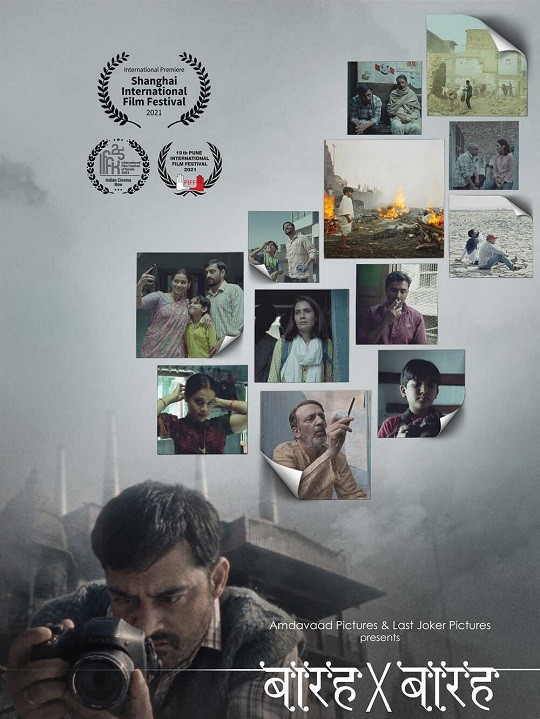Barah By Barah
Introduction
In a scene at a later timeline in the film Barah By Barah, you see the protagonist startled at a flash, only to realise that his son was taking a picture of him sleeping. This state of his was a perfect differiator between life and death, for the latter is also a state of meditation featuring a body that is lifeless. But the moment the conscious and the subconscious meet is when you are privy to the former(life). In its essence, this is the crux of Barah X Barah which for most of its runtime is a fleeting commentary of the emergence of life amidst the death of a heritage place that is soon modernizing. I remember watching a painfully gut-wrenching scene in Masaan featuring Vicky Kaushal who emotes ‘Yeh Dukh Kaahe Khatam Nahi Hota’ in the wake of his girlfriend being dead and having the character of Vicky to perform her last rites. Up until then, Vicky was so used to witnessing deaths around the ghats that there wasn’t any emotional connect there. Likewise, you see Sooraj, a funeral photographer casually going about his job without much fuss or an emotional connect, until ‘death’ for him comes in the form of a change that threatens to leave him jobless. Yet, death is also a form of reform and change, for it leads to life, something that is beautifully addressed in the film Barah X Barah here.
Story & Screenplay
Barah By Barah follows the story of a funeral photographer finding it difficult to adjust to the changing landscapes of Varanasi. The story here is niche but poetic and philosophical in many ways, calming touching upon the concepts of life and death through the characters that are stuck in a sort of a transition phase between the past featuring their heritage, and the present that features a change. And if you notice the allegory, this transition of the soul between life and death, and life again is what leads to progression, or in terms of the drama here, ‘change’ which is always constant and irrespective of the worldly forces. The screenplay here standing at a shade under 2 hours moves at a leisurely pace almost inviting the viewers to completely surrender to the vibes of the drama by making a conscious transition into the lives that the characters lead in the film.
Divided into chapters, the proceedings are niche but almost meditative in nature that timely remind you that you are no more than a speck of dust in this entire universe, and that the changing world demands that you change, and in the process evolve too. And this change by itself is told through the gaze of Life and Death, in a drama set in the ghats of Varanasi that is particularly witness to both these aspects of life in equal measures. The politics in the drama is smartly reduced in the background even as you get a gist that the 2019 elections are on the way, and in the lead up to that the beautification of the Ghats would eventually add a modern touch to the age old heritage in the drama.
The most interesting aspect of the drama is the characterization wherein you clearly see a demarcation between the levels of acceptance between various characters. So you have Sooraj, a character who is a funeral photographer who is subjectively disconnected to his profession but almost going about his chores as a habit. You would question on whether he is ‘alive’ doing his job or just a body who is dead from the inside. His form of escapism(and signs that show that he is alive and receptive to change) lies around making love with his wife or occasionally visiting a nearby brothel with his friend. You also have his father who after years of being a patriarch(you see him not being in agreement of his daughter moving out to study) has slowly allowed his ego to crumble against the cusp of change transpiring around him. Perhaps, there is a sense of regret at the twilight of his life, as he is destined to make a transition soon. Also, there is Dubey(Sooraj’s friend) who is known to be rebellious even as he participates in a slogan-war against the establishment for inducing changes in the Ghats. This is more to do with his rigidity in wanting to adapt rather than a sense of belief around his conditioned mind.
Contrary to these characters, there is Meena(Sooraj’s wife) who is more accepting towards the change. You can make out that she has been a bridge between Mansi(Sooraj’s sister) who had left home to pursue engineering, and the family of Sooraj, where new found communication helps preserve the bond that they once had. She also indulges in selfies, seen as an allegory of modernization which is different from her husband’s profession, something that signifies her accepting nature. So clearly, the women in this universe are all the more accepting. This, while the writing never loses sight of what it wishes to say about life, death and the constant process of changing and evolving wherein you briefly see Sooraj getting acquainted with a modern day photographer which doubled up as his alter ego. And yet at the end of it, the beautiful reminder acts as a constant that nothing is constant and that we will also be reduced to a portrait once the almighty presses his button! The screenplay is delicately woven and a beautiful representation of change.
Dialogues, Music & Direction
The dialogues are profound but minimalistic, often relying on the intellect of the viewers to interpret the drama based on the different phases of life and change in their own lives. The BGM is understated and almost used as an after thought, not allowing an iots of manipulation of emotions at the end of the way. The cinematography beautifully blends with the vibe of the drama through some beautiful frames that are shot in 16mm film, something that adds a different texture to the drama. In one of my favourite scenes, the depicting and transition of life and death can be made out so clearly when you notice a top angle shot featuring a lifeless body traversing the streets filled with people enjoying the festival of Holi. A timely reminder that nothing is permanent in life, and probably the only two truths of life in general. The scene was also symbolic of progression to the higher astral while eventually the soul would make its way back to life in a different form, which is also a virtue of change. The editing allows the drama to linger on which was crucial for the viewers to imbibe its essence. Director Gaurav Madan does a magnificent job in providing a philosophical take on the constant wheel of change through allegories and characters that perfectly compliment the world in which the drama is set in. Yet, the director offers a sensitive gaze that may not always be comforting but it is the ultimate truth of the universe. The direction is spectacular here.
Performances
The performances are outstanding here given that this narrative was also character driven in many ways. Aashit Chatterjee as Tathagata is wonderfully restrained as an individual that acts as a ray of hope for the protagonist who is slowly trying to reciprocate to change. Harish Khanna as Parbat has most of his character being essayed outside the frames wherein presumably he was a patriarch who was rigid with his thoughts. Yet, the arc that he pulls off is filled with regret and grief while swallowing the bitter pill of realisation a little too late in the day. And this was brilliantly portrayed by him. Geetika Vidya as Mansi beautifully portrays her character that symbolizes the modernization of the society, not necessarily through her attire but through the mindset. Akash Sinha as Dubey is a character probably on the lines of Parbat with the difference being that he does get a chance to adapt earlier. His transformation did add a nice little character arc which had him portray a range of emotions throughout.
Bhumika Dube as Meena is fabulous to witness in a character that is ever evolving even while staying true to her own reality. Her character represents the fact that change may not be done overnight but atleast a brick in the wall everyday would serve the ultimate purpose. And dare I say that her character was the catalyst in the drama that brings about acceptance even in the darkest times. Gyanendra Tripathi as Sooraj portrays a character who is far too rooted in tradition and simply refuses to adapt to change. This for me did bring up the vulnerable side of the character rather well who thought he was being lost in the dark realms of transformation thereby making him irrelevant. And that conflict with his character was so well portrayed in a performance that was subtly brilliant.
Conclusion
Boasting of sensitive performances, Barah By Barah is a poetic allegory of life and death coupled with a beautiful representation of change and evolution that makes for a wonderfully poignant watch. Available in a theatre near you and Highly Recommended!




